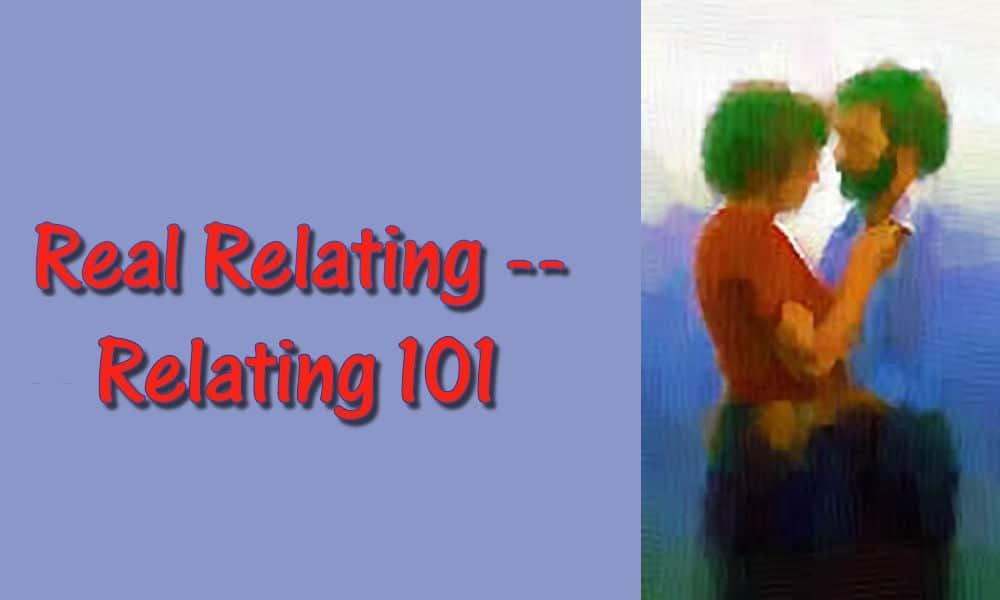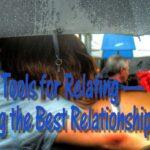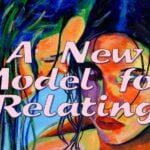Relating 101 — learning to let go of the past and the future is key to relating… and living

Simple, profound lessons in relating
The. Best. Relationship. Ever.
Purchase all formats at Amazon
Purchase digital versions (Apple, Nook, Kobo, etc.) from this page
First, a relationship is not a thing.

Couples often tell me, “I want to work on our relationship.”
I typically look around the room, then look confused, and finally say, “OK, I’ll work on it… but where is it? Can you bring it along the next time? Because at the moment, all I see are two individuals, who apparently have trouble relating.”
Sometimes they laugh, sometimes they don’t.
That doesn’t change my point. I have no permanent relationship with anything. All there ever is, is how I am acting, right now, toward the person, place, or thing.
Relating, then, is an activity, not a state.
Second, we cling to beliefs.
Now, there are only three ‘times’ — past, present, future — and two of them are an illusion. The present (this endless moment) is real, and is the only place any of us have ever lived. Past and future are totally, completely imaginary.
Surely not! I have a past! An identity!
I did a workshop for injured workers. I mentioned to the workers that much of their suffering comes from clinging to their past—to “how they imagine they were, prior to injury,” and clinging to the future—to their imaginings of “how the pain will be unrelenting and get worse.” One woman walked out at that point and later told someone she hated me because I had the audacity to challenge her story—her misery.
Funny. I thought she was there to change her relationship to her injury and pain, not support it. But clinging to one’s story is a powerful drug.
Here’s how clinging works.

You have a picture in your mind of ‘how things should be.’ The ‘thing’ can be a person, place, or object.
So, it might be, “Here is how my husband should be.”
This picture in your head is quite real-seeming and fleshed out. You have spent decades creating this picture of how another should be, and you hold your picture to be both true and real.
It’s neither.
It’s no different than the imaginings of directors of Hollywood movies. Even the most realistic movies are inventions.
As are documentaries, which always present the bias of the director / writer.
As does this blog, which is totally and completely a reflection of my biases.
Nothing you remember of the past, and nothing you imagine of the future is true. It’s a movie. A fiction. Or as we say, “…the story I’m telling myself.”
Until you get this, you are well and truly stuck in your drama, and are thus condemned to cling.
Back to “the husband” in my illustration. How he is, is how he is, right now, and if I am with him, I get to relate to him, not to my imagined version.
Now, we are predictable, to a certain extent, mostly because we’re boring, stuck, stifled people, but that’s beside the point. I may know what “he” has done in the past, but that, in and of itself, is no predictor.
What I do know is this: if I deal with him as I always have, the odds are the same thing is going to happen.
Now, if I am invested in my story of how he ought to be—“everyone knows how a husband ought to act!”— then I am no longer present with the person in front of me. I am comparing him to my imaginings and he comes up short. I then begin a campaign to get him to become who I imagine he ought to be.
This pattern applies to everything—to how I relate to money—“I should be able to spend more, more, more!” To my sex life—“How much, how varied, with whom, etc.” To my job or career—“I should be getting more, and everyone at work should cut me slack.”
In other words, there is the ‘thing’ out there, which I can choose, in the moment, to relate to, and there is the story about the ‘thing’ I have in my head.
Always, there is a story, and a reality.

If I choose to cling to my story, pretending what’s in my head is real, I will suffer.
If I choose to relate, in the moment, to the person, place, or object I am relating to, there may be difficulties, but I will not suffer.
I will not suffer because I am not expecting anything other than ‘what is.’
Is it possible to live this way?
Yes, it is.
The key is understanding the movie in your head. You have to completely ‘get’ the concept that your stories are not real, are not predictive, and are not very valuable.
Now, the stories will be there until you die. We are meaning-making creatures, and our meaning-making comes via the films in our heads. Buried in all the sequences are labels, descriptions, warnings. Our safety depends on knowing not to step in front of the onrushing bus.
Beyond that, stories are just stories.
Reality is in the moment, and only involves the present choice. Do I listen or shut down? Do I express curiosity, or deliver criticism? Do I stay put or run away? Do I try to keep things “just as they are,” or do I know, deeply, that this is impossible?
As you interact with the things with which you relate, notice how the movies start running. Have a breath and drag your attention back to the moment. Let the stories, the demands, the expectations, fade, and just be present, with curiosity. You may be surprised at how much more interesting the moment becomes.





